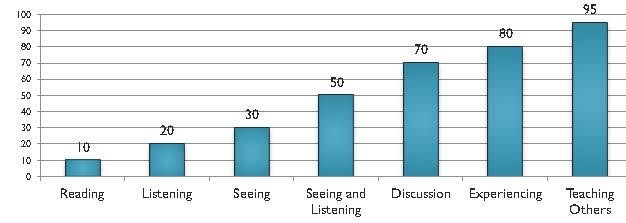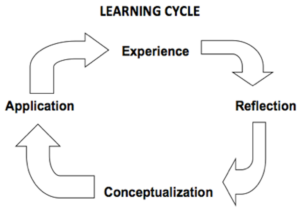
Years ago I had the opportunity to attend a workshop by Stephen Covey. It was broadcast on the internet, and Nur University, as well as many other institutions throughout the world, organized local workshops to participate in it.
After all these years, I still remember a graph presented in that workshop, showing different methods of teaching and learning and the percentage of knowledge that participants tend to retain from each method.

As you can observe, the more participatory the method, the deeper the learning. This makes sense, considering that human beings need to feel actively involved for transformation to take place. Participation is a requirement for significant learning.
Of course, participatory activities are only relevant if they contribute to a deeper understanding of the topic being studied. To ensure this, in our workshops, we use a learning cycle with the four phases of Experience-Reflection-Conceptualization-Application.

Designing a workshop based on the learning cycle provides the participants with a variety of opportunities to connect to the workshop’s topics, consider them from the perspective of their life experiences, integrate and test new ideas, and practice them in a safe environment while getting feedback from other participants and the facilitators.
Structuring the workshop based on the learning cycle provides ample opportunity for discussion and experience, two of the activities mentioned by Covey that lead to deeper learning,
During the first phase, the participants take part in experiences that generate interest in the topic.
During the reflection phase, they participate in discussions, responding to questions based on their previous knowledge or experience.
During the application phase, the participants gain firsthand experience of what they are learning, carrying out group activities that help them to consolidate their understanding or to develop skills. They may also plan how they will apply the concepts in their lives.
Since teaching others is what most consolidates learning, during the workshops, participants also consult on what they can do on an ongoing basis to continue interacting with the concepts of Transformative Leadership and share them with others.
One path participants can explore is working with youth, using the workbook Transformative Leadership for Youth that includes discussion activities, simple investigations, and art activities. This facilitates the process of teaching the concepts of Transformative Leadership for those who are just beginning to share them with others. (See blog article “Beauty and Knowledge Empower Youth with Purpose”.)
Another helpful practice is to form ongoing learning groups that meet regularly in person or online to share experiences or to study a book that focuses on particular capabilities of Transformative Leadership.
If you have the chance, we strongly urge you to come to the workshop in San Diego and experience this process for yourself. For more information, write to translead9@gmail.com
